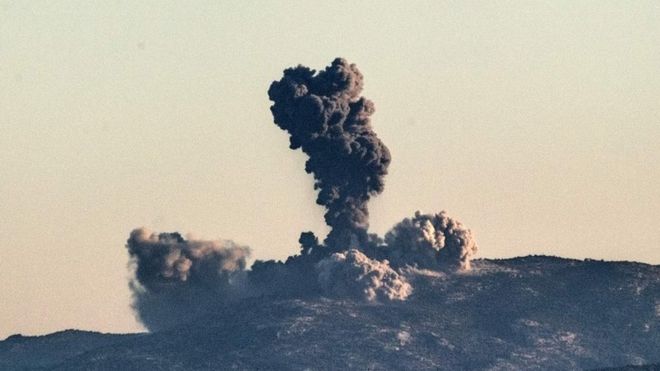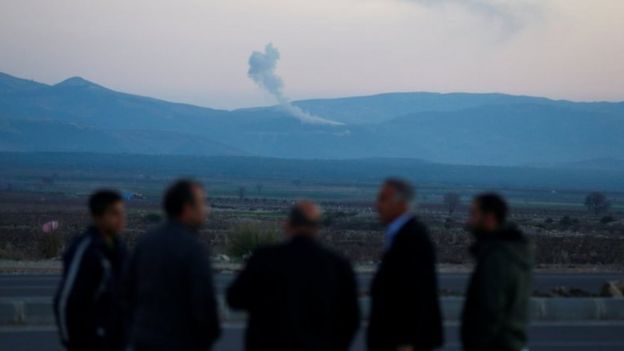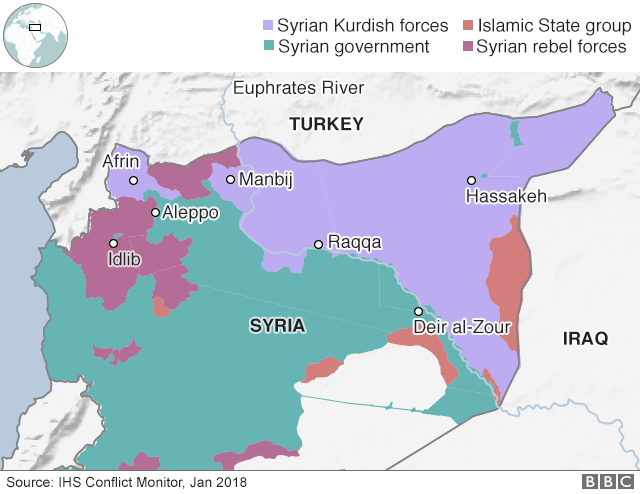 |
| Turkish war planes hit Kurdish positions on the Syrian side of the border on Saturday |
Turkish war planes have launched air
strikes on Kurdish fighters in northern Syria in a move likely to raise
tensions with the US.
Turkey wants to oust the YPG militia, which it calls a terrorist group, from Afrin region on its southern border.The US-backed YPG says at least nine people were killed in the air strikes.
Russia has moved its troops away from Afrin, saying it is concerned but will not interfere. Syria denounced Turkey's "aggression" and "brutal attack".
Turkey had been shelling the area for two days, ahead of its declaration of a military operation on Saturday.
In a nutshell: The 100, 300 and 700-word story
Turkish Foreign Minister Mevlut Cavusoglu says Turkey has notified all parties involved - including the Syrian government - about the offensive. Syria denied this was the case.
What is happening in Afrin?
On Saturday, Turkey announced that an air and ground campaign, dubbed "Olive Branch", had been launched at 14:00 GMT, targeting the Kurdish YPG (Syrian Kurdish People's Protection Units) and Islamic State (IS) group jihadists.The operation would be carried out "with respect for Syria's territorial integrity", it added. A later statement said 108 targets belonging to Kurdish militants had been hit.
Pro-Turkey rebels, known as the Free Syrian Army, also began moving into the area, according to the state-run Anadolu news agency.
The YPG said the strikes had killed at least six civilians and three fighters, with another 13 civilians wounded. One of the fighters belonged to the YPG and the other two were from its all-female affiliate, spokesperson Birusk Hasaka said.
Ankara also said there were casualties, but they were all Kurdish militants.
Prime Minister Binali Yildirim told reporters that ground forces would join the operation on Sunday.
Turkey's military has been shelling the area since Thursday, a move which it said was in response to fire coming from the area.
On Saturday, a spokesperson for the YPG-led Syrian Democratic Forces (SDF) said it would have no choice but to defend itself if attacked.
Risks of opening new front 'huge'
Mark Lowen, BBC Turkey correspondent, near border with SyriaIn mid-afternoon the Turkish air strikes began, with plumes of smoke rising above Afrin. On the ground, Syrian rebel fighters backed by Turkey moved in, the military incursion rather inappropriately named Operation Olive Branch.
But the risks are huge - the offensive pits Turkey against its Nato ally the US, which backs the Kurdish militia against IS, infuriating Ankara. Russia, which has troops in the area, has urged restraint - an MP in Moscow says it will be discussed at the UN.
The Syrian regime warned it would be seen as a violation of Syria's sovereignty. An estimated half a million people have been killed in the Syrian war. With this new front, the danger is that number will rise again.
Why is Turkey targeting US-backed groups?
The YPG has been a key part of the battle against IS in Syria, and has been supported by the US.Turkey, however, believes the group has links to the banned Kurdistan Workers Party (PKK), and has for several months been threatening to clear Kurdish fighters from Afrin and another city, Manbij, which lies 100km away.
Turkey's military plans seem to have been accelerated by an announcement from the US that it will help the SDF alliance build a new "border security force" to prevent the return of IS.
 |
| Saturday's air strikes raise the prospect of deeper strains between Turkey and the US. |
The YPG and SDF deny any terrorist links - a claim backed by the US government.
But President Recep Tayyip Erdogan called the border force a "terror army".
Disagreement over the Kurdish fighters has created a sharp division between the Nato allies.
The US state department has appealed for calm, and attempted to downplay portrayals of a new "border force", instead characterising the new development as security training.
How have Russia and the US reacted?
Russia's foreign ministry says it is concerned by news of the offensive, and is urging restraint.It said Foreign Minister Sergei Lavrov and his American counterpart Rex Tillerson had discussed "measures to take aimed at securing stability in the north of the country".
Russian senator Frants Klintsevich - who is the deputy chairman of the defence and security committee - earlier told Interfax news agency that Moscow would only respond if Russian bases in Syria were threatened.
He said that Russia has been placed in a difficult situation, as it has "good relations with both Damascus and Ankara".
Turkey's military and intelligence chiefs had been trying to get Russia's agreement to allow Turkish planes to use the Russian-controlled airspace above Afrin.
Moscow is a key ally of Syrian President Bashar al-Assad and until now, had a contingent of soldiers at the airport in the centre of Afrin.
It is not yet clear if Russia's claim that it will not interfere precludes allowing use of its airspace.
Turkish Foreign Minister Mevlut Cavusoglu also discussed the military offensive with US Secretary of State Rex Tillerson.
No details of the conversations have been provided.
Credit: BBC









Post a Comment